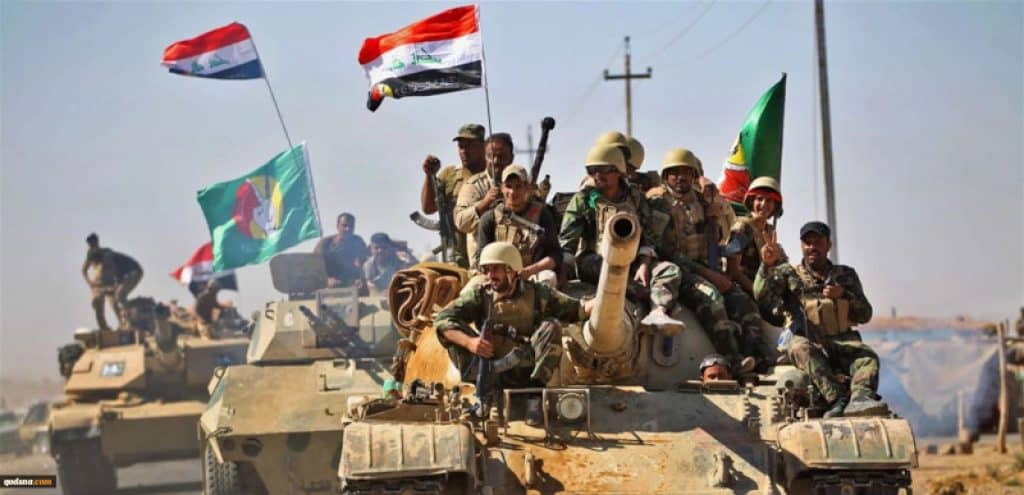
The Qatari New Arab reported on July 17 that Esmail Ghaani, the commander of the Islamic Revolutionary Guards-Quds Force (IRGC-QF), met with Tehran’s Iraqi proxies in Baghdad earlier this week. Ghaani reportedly warned the militia commanders that an Israeli attack against them in Iraq is “imminent,” while also instructing them to stay vigilant against an Israeli intelligence penetration.
Iran-backed militias in Iraq largely sat out the Iran-Israel conflict. Tehran values the political and economic influence these militias hold in the neighboring country and is thus wary of inviting a damaging campaign from Israel or the United States against them. Economically, Iraq is a crucial lifeline for Iran, including by generating roughly $1 billion in illicit oil profits. The militias’ influence in the oil sector is enabled by their prominent positions in the Coordination Framework, Iraq’s governing coalition of Shiite political parties—many of which are militia-affiliated and backed by Iran.
Instead of taking decisive military action against Israel or the US during the recent conflict, prominent militias including Asaib Ahl al Haq, Harakat Hezbollah al Nujaba, Kataib Hezbollah, and Kataib Sayyid al Shuhada relied on statements expressing their support for Iran, condemning Israel, calling for an end to American presence in Iraq, and issuing vague threats to the US if it got involved in the war.
Only a limited number of unclaimed drone and missile strikes occurred on Iraqi soil during the 12-Day War. On June 13, three drones targeted US forces at Ain al Asad base in western Iraq. Attacks continued against three American bases in northeast Syria and the US consulate in Erbil overnight on June 14.
Four Iraqi military bases were again struck on June 24, and the radar equipment at two bases was damaged. These particular attacks are unclaimed, but there is speculation that Iran-backed militias, frequent antagonists in the region, may also be behind them. Alternatively, Israel may have conducted these attacks to limit Iraq’s ability to monitor Israel’s movements in Iraqi airspace.
In contrast to the 12-Day War, Iran-backed militias in Iraq, under the umbrella of the Islamic Resistance in Iraq (IRI), launched hundreds of attacks at Israel and American forces over the course of the war begun by Hamas’s October 7, 2023, massacre.
In the weeks following the direct conflict between Iran and Israel, unmanned aerial vehicle (UAV) attacks have targeted energy infrastructure in Iraqi Kurdistan. Drones struck half a dozen oil fields, including sites operated by American companies, in Iraqi Kurdistan during the week of July 13. The Kurdistan Regional Government (KRG) accused the Popular Mobilization Forces (PMF), the Iraqi security institution comprised largely of Iran-backed militias, of launching these attacks. The Iraqi government denounced this allegation; however, Iran-backed militias have previously targeted the region.
Tehran regime anticipates another war
During a July 17 meeting, the heads of the Islamic Republic’s two main armed forces, the conventional military and the IRGC, stated that the regime is prepared for another round of escalations. Islamic Republic Army Commander Major General Amir Hatami and IRGC Commander Mohammad Pakpour discussed Tehran’s strategy during the 12-Day War and claimed that they are “ready to strike the enemy [Israel and the US] again.”
The regime-funded Press TV cited an anonymous Iranian official on July 17 who claimed that the “Our [Islamic Republic] intelligence indicates Washington seeks talks to prepare for war, not peace. If so, we see no reason to waste time and would rather focus on preparing for conflict.”
Similarly, the former Iranian ambassador to Afghanistan, Hassan Kazemi, stated on July 16 that the likelihood of another confrontation with Israel remains high, adding that “based on evidence, the other side [Israel] is seeking repairs and preparations for the operation.”
Citing Israeli officials, Axios reported on July 7 that Jerusalem believes the Trump administration would give Israel a green light for another attack wave against the Islamic Republic. The outlet added that Israel is bracing for another potential war with Iran, should the regime seek to relaunch its nuclear program.
Voices in Tehran maintained their threatening tone regarding the regime’s nuclear capabilities after the US strikes against the three nuclear sites. Ali Shamkhani, senior advisor to the supreme leader and in charge of Tehran’s nuclear file, previously warned, “Even if [the] nuclear sites are destroyed, [the] game isn’t over, enriched materials, indigenous knowledge, political will remain.” Similarly, the IRGC vowed in a June 22 statement to continue the regime’s nuclear efforts: “This aggression will only strengthen the determination of our young and committed scientists to continue advancing and developing this [nuclear] field.”
Speculation remains about whether Israel has, in fact, entirely halted its operations across Iran after the ceasefire. Mysterious reports of explosions throughout the country, with many occurring at regime-owned facilities and complexes, lend credibility to the possibility that Israel remains active in targeting Iran.
Janatan Sayeh is a research analyst at the Foundation for Defense of Democracies focused on Iranian domestic affairs and the Islamic Republic’s regional malign influence. Bridget Toomey is a research analyst at the Foundation for Defense of Democracies focusing on Iranian proxies, specifically Iraqi militias and the Houthis.
